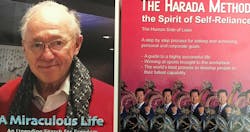Norman Bodek is on the telephone with an urgent message: American CEOs must do more and do better to improve the success of their organizations.
“What’s the barrier for us to become as efficient and effective as possible to compete internationally in the world? Of course, it rests with the CEOs,” he says.
Bodek’s mantra: A company will be its best when it helps its people be their best.
“If the people grow, the organization grows. It’s not complicated,” Bodek says.
Lean aficionados will be familiar with Bodek, but for the unacquainted, he is one of the earliest supporters of lean thinking -- although he doesn’t particularly like the word lean. “It’s never been pure enough,” he says.
Nearly 30 years ago, IndustryWeek dubbed Bodek “Mr. Productivity,” as we shared a story of his determination to help American companies do better by introducing them to advanced management philosophies and techniques, primarily from Japan. In that effort, Bodek has visited Japan more than 80 times, published over 100 Japanese management books in English, and met leading management gurus including W. Edwards Deming, Joseph Juran, Kaoru Ishikawa as well as Taiichi Ohno and Shigeo Shingo. And that is just a taste of his efforts.
Now in his mid-80s, Bodek shows few signs of slowing down. Last year he wrote and published A Miraculous Life: An Unending Search for Freedom. And in early June he presented a keynote address to a group of C-level leaders.
IndustryWeek caught up with Bodek via telephone earlier this year, where he doubled down on his focus of the past few years: the human side of lean. In 2012 Bodek co-wrote and co-produced a book on the topic, titled The Harada Method-the Spirit of Self-Reliance, with Takashi Harada, who developed the methodology.
The human side of lean, Bodek explains, “means developing your talent to their best.”
“I'm telling people, No. 1, is to try to run an organization where everybody is going to be the best. They are going to challenge people to continually be the best -- and to be the best they have to improve their skills and capabilities,” he says.
Develop a Goal
To accomplish that, Bodek continues, individuals “have to set a goal so they become self-reliant, [so] they're highly motivated by themselves -- they're not motivated because management has a carrot or a stick, and they focus on very high skills. And when people improve their skills, the organization gets better.”
Leadership’s job, Bodek says, is to invest in that talent development.
And that’s the second part of his message: the importance of growing skills. Bodek points to the human side of lean as a potential solution to the workforce skills shortage -- and cites Germany’s apprenticeship program as a prime example of skills-focused training. As well, he says, Japan has a national program that recognizes individuals for high skills in a range of disciplines. The U.S. lacks a skills focus, he said.
“I want people in America to focus on high skills. How can you graduate high school after 13 years and you don’t have a skill?” he asks. “It’s crazy. Nobody should graduate high school without a skill. We have to change our whole educational system.”
Give people a skill and you give them “an opportunity to become great in their lives,” Bodek says.
Developing talent requires time and commitment. Bodek believes that for many U.S. companies, a focus on short-term thinking rather than long-term success has prevented them from making the necessary investments in their people, and ultimately has stunted organizations’ potential for success.
He remains committed to changing their perspective.
“I want people to recognize the talent within their own organizations and be willing to invest internally on that talent,” Bodek says. “I’m trying to focus on this issue.”
About the Author
Jill Jusko
Bio: Jill Jusko is executive editor for IndustryWeek. She has been writing about manufacturing operations leadership for more than 20 years. Her coverage spotlights companies that are in pursuit of world-class results in quality, productivity, cost and other benchmarks by implementing the latest continuous improvement and lean/Six-Sigma strategies. Jill also coordinates IndustryWeek’s Best Plants Awards Program, which annually salutes the leading manufacturing facilities in North America.
Have a story idea? Send it to [email protected].

